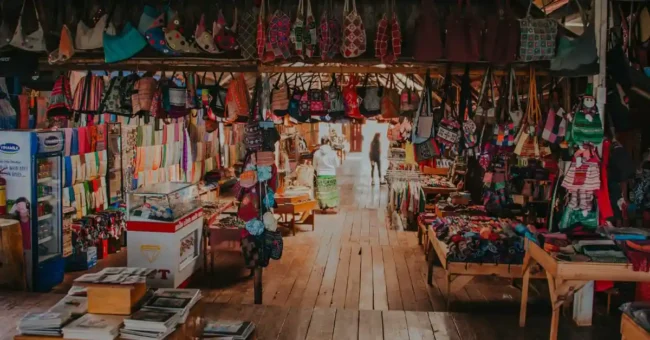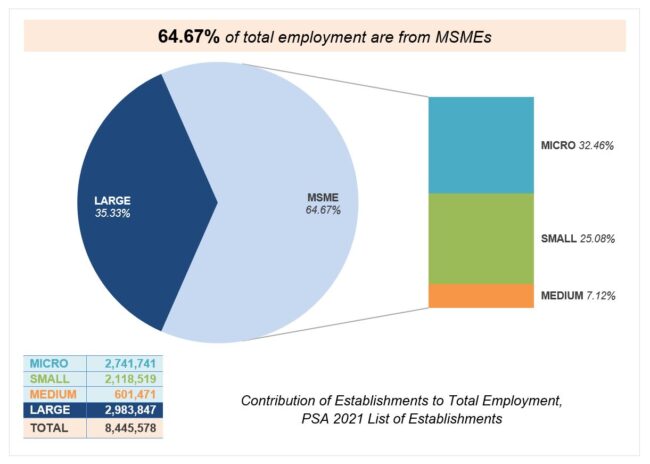Supporting Small Businesses in the Philippines
In this article, we will explore how small business owners in the Philippines are making a significant impact on their communities and the economy as a whole. We will delve into the challenges they face and the innovative ways they overcome them to succeed in a highly competitive market.
Contents

Importance of Small Business in the Philippines
Small businesses play an essential part in the Philippine economy, constituting the majority of businesses nationwide. According to data from the Department of Trade and Industry (DTI), 99.5% of registered Philippine companies fall into one of three MSME categories (micro, small, and medium enterprises ). MSMEs contribute greatly towards job creation, poverty reduction, economic expansion, and nation-building.
MSMEs account for around 63% of job creation across the Philippines, according to the Philippine Statistics Authority. They also present opportunities for self-employment that help alleviate poverty and raise the standards of living among many Filipinos.

Small businesses play an essential role in driving economic development across the Philippines. According to data compiled by the DTI, they account for approximately 40% of gross domestic product (GDP). As such, small businesses serve as major economic drivers generating income and contributing value creation within local communities.
Overall, small businesses in the Philippines cannot be underestimated; they form an essential part of its economy by providing employment, income, and opportunities for entrepreneurialism and expansion.
Challenges Faced by Small Businesses in the Philippines
Even though small businesses are an integral component of Philippine economic life, their owners encounter many hurdles to expansion or investment decisions. According to research conducted by the World Bank, one major hindrance to their growth is access to financing resources; around 60% of SMEs cited funding as one of their top two obstacles when expanding or investing. This makes expanding operations or purchasing equipment and technology challenging tasks.
Competition is another key hurdle faced by small businesses in the Philippines. Operating in such highly-competitive industries as food, retail, and tourism is often challenging for these enterprises.
Government regulations also present small business owners in the Philippines with difficulties. While certain regulations may be necessary to protect consumers and guarantee fair competition, others can be burdensome and expensive for small companies. Registering their business and complying with various regulatory requirements can take time and money, especially for those starting.
Real-world examples of these challenges can be seen through the experiences of small business owners in the Philippines. For example, one local restaurant owner in Manila struggled to secure a loan from her bank to expand her restaurant, despite having a comprehensive business plan and track record of success. Meanwhile, one handicrafts store owner in Cebu found it hard to compete against larger retailers who offered similar products at lower prices.
Overall, the challenges experienced by small business owners in the Philippines highlight the need for increased support and resources to assist their success.
Innovative Strategies and Solutions Used by Filipino Small Business Owners
Even though small business owners in the Philippines face many unique obstacles, many are finding effective strategies and solutions to meet them and thrive. Here are a few successful examples:
Collaborations and Partnerships
Small business owners are teaming up with other businesses – both big and small – in order to form mutually beneficial relationships that offer them both mutual advantage. For example, a local bakery could team up with a coffee shop so both could offer each other’s products and increase foot traffic together, expanding both customer bases while expanding revenue streams.
Digital Presence
Establishing an online presence for any business – big or small – is becoming an essential aspect of doing business today. Small business owners in the Philippines recognize this truth, with many realizing the necessity of maintaining websites and social media pages to reach more customers or even going as far as creating e-commerce platforms to sell products online and increase reach even further.
Technology Adoption
Small business owners are discovering innovative ways to use technology in their operations in order to increase efficiency and reduce costs. Some have taken to using mobile payment systems for faster transactions, while others utilize cloud-based accounting software for inventory and accounting management.
Community Assistance
Small businesses rely heavily on their local communities for support. By engaging customers and building relationships through events and promotions, as well as offering tailored customer service that keeps customers coming back, small business owners are tapping into this vital source of help for success.
Real-life examples include the “Barkada” system – a Filipino term meaning the close group of friends – where small business owners collaborate together to promote and support each other’s businesses. Another is using social media platforms like Facebook or Instagram, where small business owners can showcase their products while engaging with customers directly, and crowdfunding platforms have even helped some entrepreneurs raise funds for their ventures.
These strategies and solutions have enabled small business owners in the Philippines to overcome the challenges they encounter and make a significant contribution to the economy. Through partnerships, digital tools, and community support systems, small businesses are able to expand and create job opportunities, ultimately leading to the overall economic development of the nation.
Success Stories of Small Business Owners in the Philippines
Small business owners in the Philippines have shown resilience and creativity in the face of challenges. Here are a few examples of successful small businesses that have made a big impact:
- Jacinto and Lirio – The social enterprise produces sustainable and eco-friendly fashion accessories made from water hyacinths. The company provides livelihood opportunities for marginalized communities and helps clean up waterways. Jacinto and Lirio has won several awards and has been featured in international media.
- Messy Bessy – The homegrown brand produces natural and non-toxic cleaning products. Messy Bessy also provides employment opportunities for at-risk youth and donates a portion of its profits to a foundation that supports education and livelihood programs for underprivileged communities. The brand has expanded its product line and now has several physical stores and an online shop.
- HABI Footwear – The social enterprise produces handwoven shoes made from indigenous fabrics. HABI Footwear provides livelihood opportunities for weavers from various communities across the Philippines. The company also promotes Filipino culture and heritage through its products.
These successful small businesses have a positive impact on their communities and the economy. They provide employment opportunities, promote sustainable practices, and support marginalized communities. Their success stories serve as inspiration for aspiring entrepreneurs to make a difference through their own businesses.
Conclusion
Small businesses in the Philippines play an indispensable role in providing employment opportunities, stimulating economic development, and contributing to the overall well-being of communities. Small business owners in the Philippines, facing many difficulties, including limited access to funding and resources, competition among other businesses, and government regulations, are finding creative solutions and strategies to overcome them.
Small Businesses in the Philippines owners are working together and using technology effectively to make an impressive difference in their communities and industries. From the success stories of small business owners in the Philippines, we can see their positive effect on society overall. It is, therefore, vital to support Small Businesses in the Philippines in order to foster continued growth and prosperity and secure a brighter future for the Philippine economy and people.
